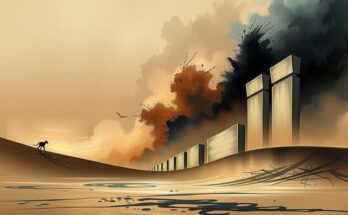The DRC faces renewed conflict as M23 rebels advance, triggering memories of past wars. Communities are fleeing or preparing for battle amidst regional troop support from Rwanda and Uganda, raising concerns of broader instability. Analysts draw parallels to historical invasions, emphasizing the persistent humanitarian crisis and resource exploitation. A focus on local governance and dialogue is crucial for addressing the conflict.
The ongoing conflict in the Democratic Republic of the Congo (DRC) has reignited grim memories reminiscent of past wars as M23 rebels advance towards Kinshasa, following their capture of key cities like Goma and Bukavu. Amidst this turmoil, communities are either preparing for warfare or seeking refuge, and the DRC government’s offer of a $5 million reward for M23 leaders has had little impact on the rebels’ progress.
As the M23 continues its push through North and South Kivu, Uganda has bolstered its troop presence along the border with the DRC. The Ugandan army claims to be engaged in combat against several armed groups, including the Allied Democratic Forces (ADF) and CODECO, which has reportedly intensified violence against civilians, leading to 51 deaths in February.
Political analysts are drawing parallels between the current situation and the tragic history of the Second Congo War. Paul Nantulya from the Africa Center for Strategic Studies highlighted that both Rwanda and Uganda, key players during the 1998 conflict, now appear to be echoing their past involvement. The instability has resulted in an ongoing humanitarian crisis, with millions of lives lost and resources plundered.
Rwanda has historically cited concerns about anti-Rwandan militants operating within DRC, and this has been a significant factor in the continuous unrest. The First and Second Congo Wars were initiated by Rwanda’s incursion into the DRC, ostensibly to pursue Hutu militants following the 1994 genocide. This led to a prolonged conflict with broader regional implications and prompted various foreign interventions.
Although the overt fighting ceased in 2003, violence has persisted, with allegations of resource exploitation continuing. Reports identify involvement from both Rwandan and Ugandan officials in illicit activities within the DRC, further complicating the political landscape. The International Court of Justice held Uganda responsible for violating international law during the conflicts, ordering reparations to the DRC.
Current developments signal a return of regional interference, with M23 and other groups vying for power against the backdrop of rampant corruption and resource greed. Local experts argue that acknowledging the sufferings of the Congolese people must take precedence in any dialogue about the conflict’s resolution. Combating this intricate issue will require regional cooperation and a concerted effort to foster stability and governance within the DRC.
As unrest escalates, Kambale Musuvali from the Center for Congo Research calls attention to the urgent need for a sustainable solution. He emphasized that the DRC’s stability is crucial not only for its citizens but for the continent as a whole, asserting that “the people of the Congo have to be alive so that they can rebuild the country for the benefit of the African continent.”
The resurgence of conflict in the DRC serves as a painful reminder of its tumultuous past, highlighting both historical grievances and contemporary struggles for power. With M23 rebels advancing and regional troops involved, the situation risks escalating into a broader crisis. Successful resolution hinges on both effective internal governance and genuine dialogue, prioritizing the well-being of the Congolese people and the integrity of the nation as a step towards stability in the region.
Original Source: www.aljazeera.com




